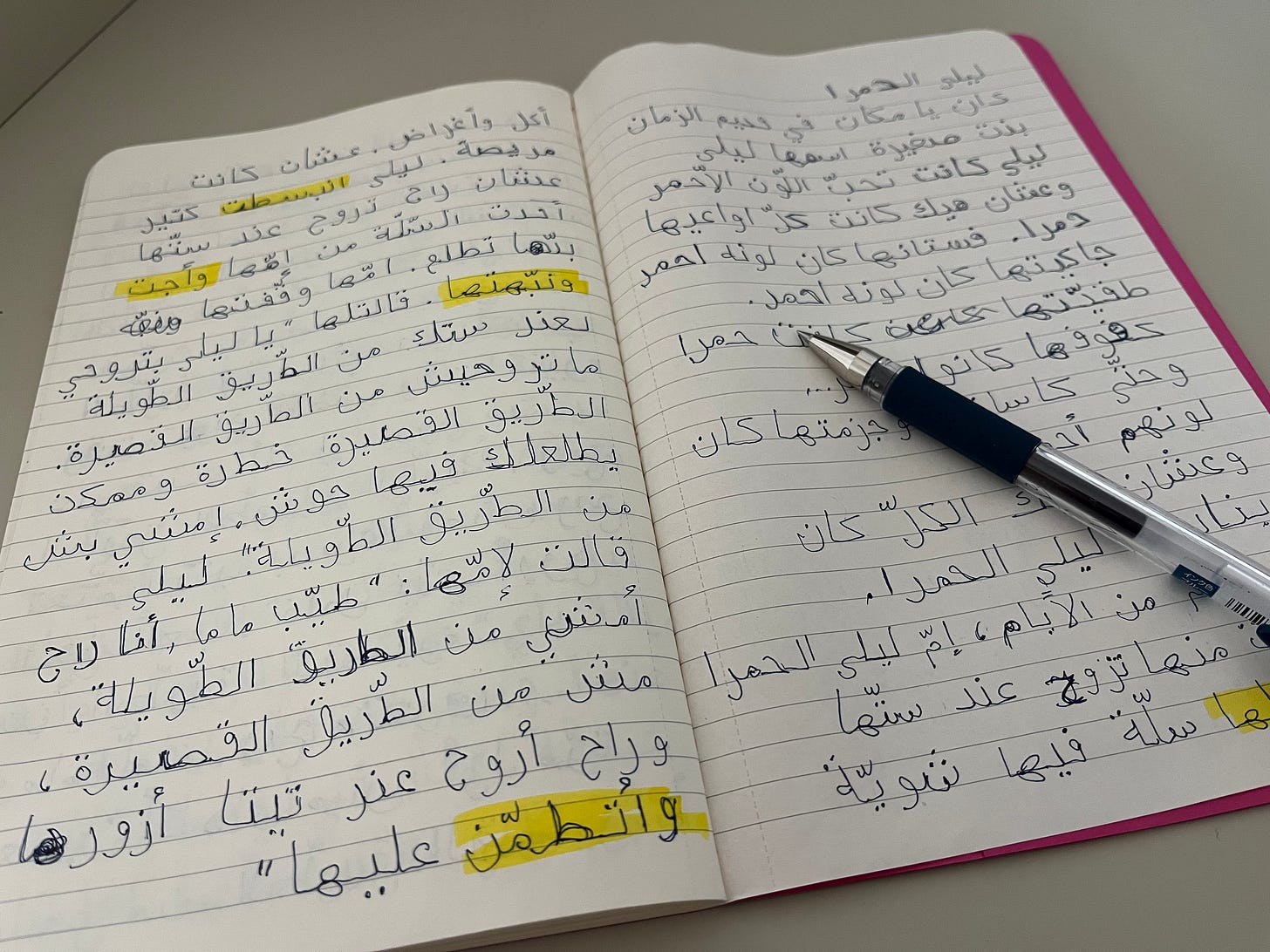One morning recently, instead of working on a client project due that day, I found myself listening to “Little Red Riding Hood” in Arabic. Again. And when I was done, I started writing it down simply because it felt very satisfying to do so.
I couldn’t stop until I filled a whole page. Only then was I able to turn my attention to what I was supposed to be working on.
You know how they say “eat the frog first thing in the morning”? It’s time to debunk that productivity myth. Because whenever I try to force myself to eat the frog first thing in the morning, either no frogs get eaten that day, OR it takes f-o-r-e-v-e-r to chew that thing.
The thing is, the frog WILL GET EATEN no matter what. It will be swallowed whole, as always, two hours before the deadline. But it will go down much more smoothly if you’ll have eaten dessert first.
This is my timeless contribution to the personal development landscape that will inspire joyful productivity for generations to come: EAT DESSERT FIRST!!!
I spent a couple of mornings writing down Little Red Riding Hood, one page at a time, and pretty much memorizing it word for word in the process.
This was not a very rational behavior. I had said I wanted to be conversational in this language, and I also said that “I want to be conversational” is not a good goal to pursue because it’s too vague.
I have been talking to Sam on iTalki once a week, but in the meantime, I have been looking for a good USSM (ultra-specific super-motivating) goal to pursue because I think it is good to have one at all times.
There were a lot of potential ultra-specific goals that I could have picked:
For instance:
Talk to the owner of that grocery store down the hill.
Go back to the Mahaneh Yehuda market and finally buy those cherries, in Arabic (maybe not those specific ones, but some other cherries).
Go back to that coffee shop and buy a cup of Iraqi tea and talk to its owner.
Record an MFYF video telling a story about my dog (boring, done that in some other language already, and not challenging enough).
None of these would be super challenging at this point, but still, each of them would give me a nice feeling of having arrived somewhere. Only I didn’t feel like doing any of these things.
Then, a perfect USSM goal that was imposed by outside factors came up. Those are the best because they eliminate the decision-making process so you can stop thinking and get straight to doing.
A while back, I got in touch with a company that organizes immersion weekends in Arabic in various locations in Israel. Basically, you spend a weekend with a group of other learners, usually in an Arab village, and speak only Arabic the entire time.
It sounded cool, so I wrote to them. A couple of weeks ago, they got back to me and informed me that they had an immersion weekend coming up and asked if I wanted to sign up.
They warned me that it was for advanced learners and that I had to pass an online language test to join. Either that or I could record myself speaking Arabic. The girl wrote: “Just record yourself as if you’re trying to sell me something in Arabic. Can you do that?” I said, “Yeah, sure, I’ll do it by the end of the week.”
I lied (as always). I didn’t feel like I could sell her something in Arabic (or in any language, for that matter), and I didn’t feel like an advanced learner at all (certainly not when I talked to her three long weeks ago).
That’s my main strategy, my secret weapon, if you like, when it comes to learning languages. I lie shamelessly, and then, because I don’t like to be discovered as a liar, I freak out and use that adrenaline as a fuel to get me to the level that I’d lied I’m at.
Seriously, try it. It’s the most foolproof learning strategy ever. I might patent it. (DO NOT try it if you’re pregnant or have high blood pressure or suffer from restless leg syndrome, whatever that is.)
That’s my main strategy, my secret weapon, if you like, when it comes to learning languages. I lie shamelessly, and then, because I don’t like to be discovered as a liar, I freak out and use that adrenaline as a fuel to get me to the level that I’d lied I’m at.
I lied, but I knew that if I put my heart and mind to it, it wouldn’t be a lie by the end of the week. Only I didn’t feel like putting my heart and mind to it.
Maybe it’s because I knew I couldn’t afford to go to an immersion weekend right now. Or because I got terrified at the prospect of spending a whole weekend with a bunch of total strangers: I saw pictures from their previous events, and it looked like they involved mingling.
So I didn’t do it.
Instead, I found myself reciting “Little Red Riding Hood” in Arabic. Daily.
And all the while, I was thinking, how breathtakingly beautiful fairytales are. How soothing and powerful. How wise and deep, humanity stripped down to its childlike basics. How primal, how kind. How universally violent. How totally useless in moving me towards my long-term goal of being conversational in Arabic.
How mindbogglingly similar they are across cultures and languages that never had any contact with one other.
It seems like all cultures have tales1 about creatures trying (and sometimes managing) to tear each other apart.
Little Red Riding Hood gets eaten because of her naïveté (and because she didn’t listen to her mom).
In a famous Russian folktale Kolobok, the main character — Kolobok, meaning “a donut/cake”, kind of like the Gingerbread Man — avoids getting eaten by several different animals but then ends up eaten by the Fox because of his vanity.
The Yaqui people (an indigenous people of Mexico) have a folktale, “Skinny Coyote and Bunny” (Wo’i Wakila into Taavu), where Coyote tries to eat Bunny, but Bunny tricks him and avoids getting eaten.
The Buru people (a people of the island of Buru in Indonesia) have a similar legend, about a Monkey and a Crocodile (Mia tu Emhalat) where a Monkey also cleverly avoids being eaten by a crocodile. Here it is in its entirety:
In another Buru legend, a sea bird severs a jungle bird’s leg, and that blood reddens the body of a parrot who happens to be nearby, which is why parrots are red nowadays.2
There is a reason why people — children and adults — are drawn to traditional tales. (And why children should be exposed to the brilliance of Neil Gaiman and Lemony Snicket.) And there is a reason why softening those tales by putting grandmas in closets is a bad idea.
Why? Because kids know. Kids know that that’s not how it is in real life.
When my daughter says, before bed, “I’m afraid someone will come and choke me to death at night” or “I’m scared I’ll be kidnapped in my sleep,” it is not because she read about it in a fairytale. It’s because she knows these things can happen in real life.
At least in a fairytale, the horror is contained, and the evil is either defeated, or at least there is some sort of redemption or internal logic (e.g. oh so that’s why parrots are red.)
Then it hit me. I knew what my next USSM goal would be. I have a bilingual book of Rusyn folktales. And I have a bilingual book of Buru legends. I’ll choose a legend or a story from one of those collections, and I’ll retell it in Arabic, in my own words.
I’ll give myself until the end of March to do that.
I guess sometimes we need to take a detour. Maybe because taking on a speaking-related USSM goal is too stressful for me at the moment.
Or maybe because I desperately want to believe that, like in most traditional tales, the evil will be defeated, or at the very least, that it will all somehow make sense in the end.
Friends with Words takes many hours a week to create. If you enjoy my writing, consider making a one-time or monthly donation ☕
If you’re a writer on Substack, consider recommending Friends with Words to your readers (Go to Dashboard>Recommendations>Manage>Add recommendation)
I’m aware that fairytales and folktales are not the same thing, but I’m treating them as the same as both based on traditional narratives.









I thought you were going to recite Little Red Riding Hood to her instead...
I would definitely pick reading, writing out, memorizing, telling and retelling fairy tales over the goal of being able to say a useful useful sentence to someone.
Because. On those nights when The State of the World spends time analyzing itself at the back of my mind till 4 am, when I can’t do anything about it or when there’s no one to talk to or no one who could handle it… a fairly tale in my own head sounds like a treasure.